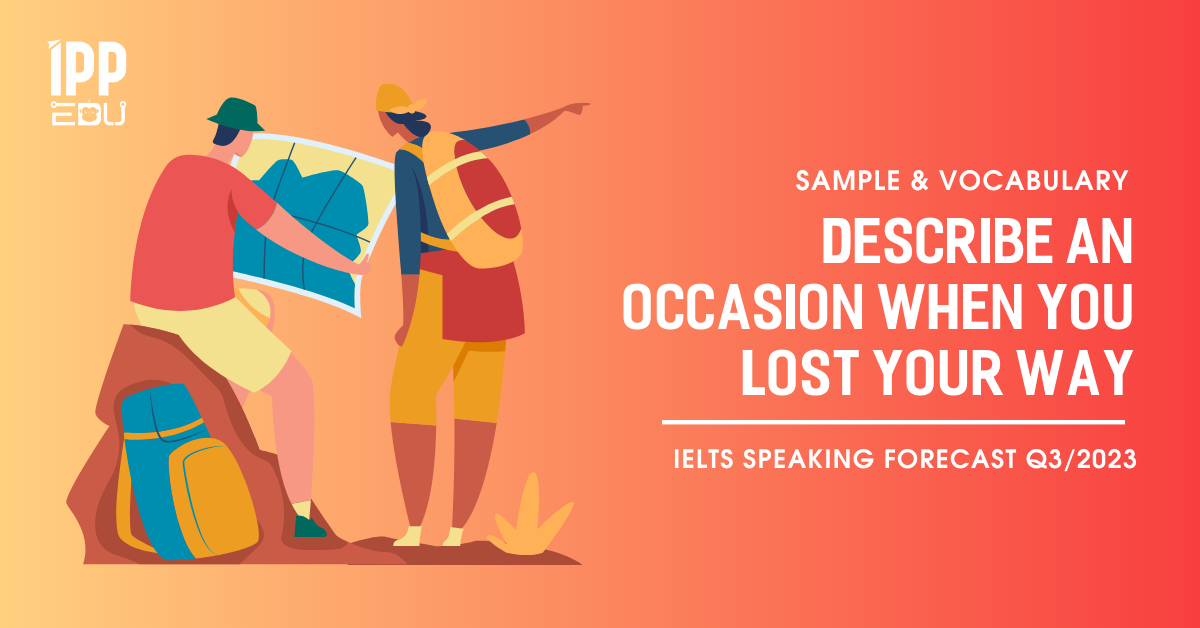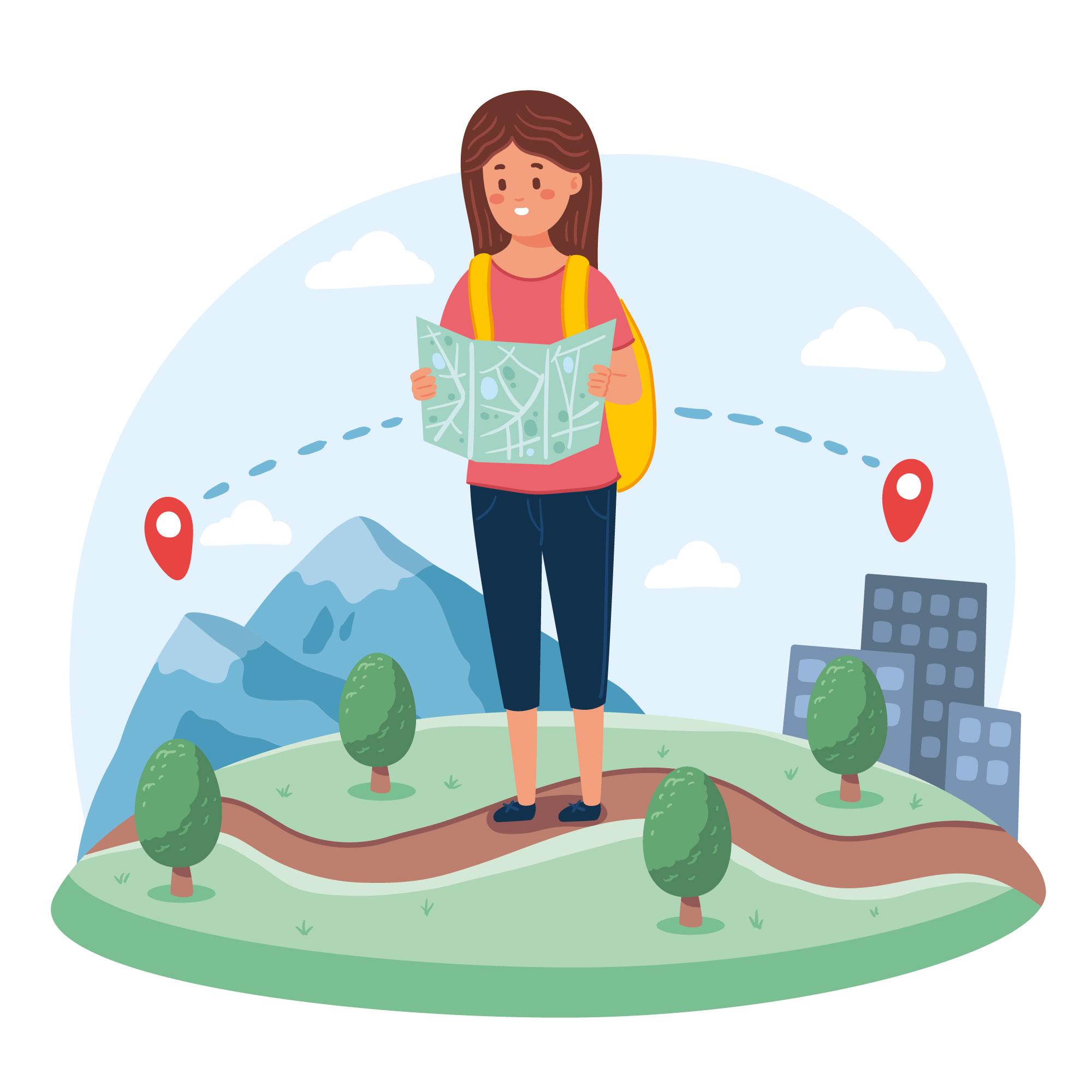Describe an occasion when you lost your way – IELTS Speaking Part 2&3
Describe an occasion when you lost your way - một đề bài không quá khó thuộc nhóm chủ đề Describe an event. Tuy nhiên, để trả lời một cách xuất sắc, liệu bạn đã nắm rõ từ vựng hay biết cách khai thác và phát triển ý tưởng một cách sâu rộng và chính xác hay chưa?
Đến với bộ Forecast IELTS Speaking 2023 Quý 3 lần này, IPPEDU sẽ cung cấp cho các bạn bài mẫu hướng dẫn cụ thể về cách trả lời IELTS Speaking Part 2&3 chủ đề Describe an occasion when you lost your way, cũng như giới thiệu một số từ vựng hữu ích để bạn có thể ghi điểm cao trong phần thi này nhé!

1. IELTS Speaking Part 2 Sample & Ideas: Describe an occasion when you lost your way
TOPIC: Describe an occasion when you lost your way.
You should say:
- where you were
- what happened
- how you felt
and explain how you found your way.
SAMPLE & IDEAS
[INTRO] Once, during a trip to this cool foreign city [name the city], I ended up getting totally lost.
[when] when I was out and about // exploring this bustling market that everyone was raving about // when I split from my group to buy souvenirs in the [name the location] // those streets were like a maze // lack of proper signs didn't help at all
=> Before I knew it, I had no clue where I was or how to get back on track.
[feeling] panic and frustration kicked in big time // the streets were jam-packed with people, // I barely understood the language => added to the chaos => I was desperate to find my way ASAP.
So, I whipped out my trusty GPS app on my phone, thinking it would save the day. But, surprise surprise, the darn signal was so weak it was practically useless. Talk about bad luck! Feeling a bit defeated, I spotted this friendly vendor nearby and figured I'd give it a shot and ask for directions.
Luckily, this vendor turned out to be a real lifesaver. They had the warmest smile and took the time to explain the way back, even drawing a rough map on a scrap of paper. I couldn't thank them enough for their kindness.
Armed with their directions and keeping an eye out for the landmarks they mentioned, I slowly but surely started finding my bearings again. It was like a victory with each turn I took, knowing I was getting closer to that market. And you know what? Eventually, I made it! The sense of relief and accomplishment was unreal.
That whole experience taught me a valuable lesson about being prepared and having backup plans. I mean, having a good old-fashioned paper map or learning a few local phrases to ask for help would have saved me a lot of stress. But hey, it also reminded me how wonderful it is when strangers lend a hand to lost travelers. It made the whole journey way more memorable, even with that rocky start.
2. IELTS Speaking Part 2 Vocabulary Highlights: Describe an occasion when you lost your way
- out and about: lang thang, đi đây đi đó
- rave about something: mải mê, say sưa
- lack of proper signs: thiếu biển báo đúng
- kick in big time: ảnh hưởng mạnh mẽ
- whipped out: nhanh chóng
- the darn signal: tín hiệu khó chịu
- give it a shot: thử làm điều gì đó
- a real lifesaver: vị cứu tinh thật sự
- draw a rough map on a scrap of paper: vẽ bản đồ trên mảnh giấy vụn
- find my bearings: xác định phương hướng
- lend a hand: đưa tay giúp đỡ
- rocky start: khởi đầu không suôn sẻ

3. IELTS Speaking Part 3 Questions: Being lost
Chủ đề Being lost trong IELTS Speaking Part 3 yêu cầu bạn phát triển ý kiến của mình và giải thích một cách rõ ràng. Hãy mở đầu bằng việc giới thiệu (lead-in), sau đó chia sẻ quan điểm cá nhân và tiếp theo là giải thích và đưa ra lý do (explanation). Bằng cách phát triển câu trả lời và giải thích một cách rõ ràng, bạn sẽ tự tin trình bày và ghi điểm cao trong IELTS Speaking Part 3 với chủ đề Being lost
Part 3 - Being lost
- How can people find their way when they are lost?
- Do you think it is important to do some preparation before you travel to new places?
- Do you think it is important to be able to read a map?
- Is a paper map still necessary?
- Why do some people get lost more easily than others?
- How do people react when they get lost?
4. IELTS Speaking Part 3 Sample & Ideas: Being lost
SAMPLE & IDEAS
1. How can people find their way when they are lost?
[Lead-in] No matter where we are or how prepared we may be, there may come a time when we find ourselves lost.
[Explain] In these moments, it's important to stay calm and make use of the resources available to us. One way to find our way is by relying on our instincts and carefully observing our surroundings for any familiar landmarks. Additionally, using a map or GPS device can provide clear directions to help us navigate back on track. If all else fails, seeking assistance from local authorities or asking for directions from trusted individuals can also guide us towards the right path. Remember, with a level-headed approach and utilizing the available tools at hand, finding our way when lost is always possible.
- rely on our instincts: dựa vào trực giác của bản thân
- a level-headed approach: tiếp cận một cách bình tĩnh
- utilize the available tools: sử dụng các công cụ có sẵn
2. Do you think it is important to do some preparation before you travel to new places?
[Lead-in] When venturing into new places, proper preparation is crucial for a seamless and enjoyable experience.
[Explain] By researching ahead of time, we can familiarize ourselves with the local culture, customs, and potential safety concerns. This preparation allows us to make informed decisions about transportation, accommodation, and activities. Additionally, knowing basic phrases in the local language can help bridge communication gaps and enhance our interactions with locals. By taking the time to prepare, we ensure a more rewarding and hassle-free exploration of new destinations.
- venture into new places: khám phá vùng đất mới
- ahead of time: trước đó
- hassle-free exploration: không phiền phức
3. Do you think it is important to be able to read a map?
[Lead-in] Knowing how to read a map is an essential skill that can empower individuals in various aspects of life.
[Explain] Whether it's navigating unfamiliar territories, planning road trips, or exploring the great outdoors, the ability to interpret maps provides a sense of direction and confidence. In today's technology-driven world, where GPS and navigation apps dominate, understanding how to read a map offers independence and resilience. It allows us to rely on our own knowledge rather than being solely dependent on technology. Moreover, reading a map fosters critical thinking skills, spatial awareness, and problem-solving abilities. Don't underestimate the value of this timeless skill in an ever-changing world.
- today's technology-driven world: thế giới hiện nay được thúc đẩy bởi công nghệ
- spatial awareness: nhận thức không gian
4. Is a paper map still necessary?
[Lead-in] In a world dominated by digital navigation systems, there is still a strong case for the necessity of a paper map.
[Explain] While technology offers convenience and real-time updates, paper maps provide a tangible connection to our surroundings and allow for unhindered exploration. They are reliable in areas with limited or no internet connectivity, making them a crucial backup when technology fails. Furthermore, using a paper map enhances spatial awareness and develops critical decision-making skills. In certain situations, where battery life or satellite signal is compromised, having a trusty paper map can be a lifesaver.
- a tangible connection: kết nối hữu hình
- satellite signal: tín hiệu vệ tinh
5. Why do some people get lost more easily than others?
[Lead-in] There are various reasons why some individuals seem to have a higher tendency to get lost compared to others.
[Explain] Firstly, spatial awareness plays a crucial role - those with less developed spatial cognition might struggle with navigation. Additionally, individual differences in attention and focus can affect one's ability to follow directions accurately. Psychological factors such as anxiety or distractibility may also contribute to getting lost more frequently. Furthermore, lack of experience or familiarity with a particular environment can increase the likelihood of becoming disoriented. Understanding these factors can help individuals develop strategies and techniques to improve their sense of direction and minimize the chances of getting lost.
- spatial cognition: khả năng nhận thức không gian
6. How do people react when they get lost?
[Lead-in] When people find themselves lost, their reactions can vary greatly.
[Explain] Some may feel a sense of panic and frustration, desperately searching for a way out. Others may remain calm and try to assess the situation before taking any action. There are those who may ask for help, seeking guidance from others to find their way back on track. Regardless of the initial reaction, getting lost can be an unsettling experience that tests one's ability to adapt and navigate unforeseen circumstances.
- an unsettling experience: trải nghiệm phiền phức
- navigate unforeseen circumstances: đối mặt và giải quyết những tình huống không lường trước được
Trên đây là Sample & Vocabulary chủ đề Describe an occasion when you lost your way thuộc IELTS Speaking Part 2 và chủ đề Being lost thuộc IELTS Speaking Part 3.
Hy vọng rằng, những hướng dẫn và kiến thức mà IPPEdu chia sẻ sẽ giúp bạn nâng cao kỹ năng và tự tin hơn khi tham gia IELTS Speaking. Đừng quên thường xuyên ghé thăm IPPEdu và tham khảo tài liệu, kinh nghiệm từ những giáo viên với IELTS 8.0+, để có những chiến thuật học tập hiệu quả nhất. Và, thông qua việc học tập và luyện tập chăm chỉ, chúc bạn sẽ đạt được số điểm mà mình mong muốn trong kỳ thi IELTS sắp tới!
Để biết được trình độ của mình đang ở level nào thì bạn có thể tham gia Test miễn phí tại IPPEdu nhé!
Theo dõi ngay fanpage: IPP IELTS – A Holistic Approach to IELTS để nhận được thêm những nội dung hấp dẫn bạn nhé!
Các khóa học IELTS tại IPPEDU
Beginner
Đầu vào: Pre A1
Đầu ra cam kết: A1
Pre-intermediate
Đầu vào: A1
Đầu ra cam kết: A2
Foundation
Đầu vào: Pre A1/A2
Đầu ra cam kết: B1
AIM 5+
Đầu vào: 3.5
Đầu ra cam kết: 5.0+
AIM 6+
Đầu vào: 5.0
Đầu ra cam kết: 6.5+
AIM 7+
Đầu vào: Pre 6.0
Đầu ra cam kết: 7.5+
